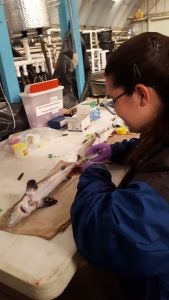Michaiah’s first sturgeon project is now published in Comparative Biochemistry and Physiology Part A: Molecular & Integrative Physiology. Her work explores the differences in stress response, immunity and metabolism in white sturgeon of different ploidies acclimated to different temperatures. Read about it at Comparative Biochemistry and Physiology Part A: Molecular & Integrative Physiology or under our Publications page. Congratulations Michaiah!
Leal, M.J., Clark, B.E., Van Eenennaam, J., Schreier, A.D., and Todgham, A.E. 2018. The effects of warm temperature acclimation on constitutive stress, immunity, and metabolism in white sturgeon (Acipenser transmontanus) of different ploidies. Comparative Biochemistry and Physiology Part A: Molecular & Integrative Physiology
